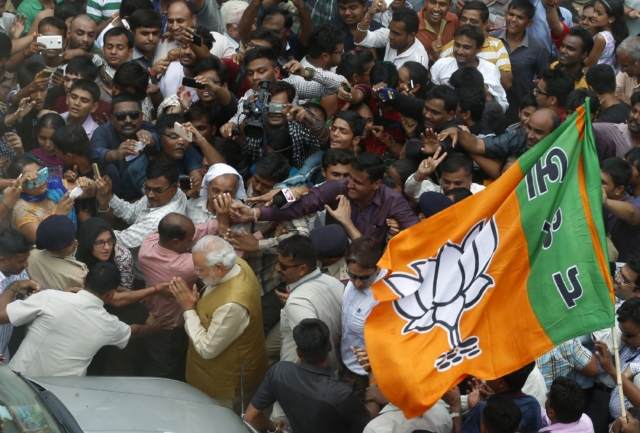Opposition candidate Narendra Modi thundered to victory on Friday in India’s election, with partial results showing that the pro-business Hindu nationalist and his party trounced the ruling Nehru-Gandhi dynasty in a seismic political shift.
Modi’s landslide, the most resounding election victory India has seen in 30 years, was welcomed with a blistering rally on India’s stock markets and raucous celebrations at offices across the country of his Bharatiya Janata Party (BJP), where supporters danced, exploded fireworks and gave out sweets.
The BJP looked certain of a parliamentary majority, giving the 63-year-old former tea-seller ample room to advance economic reforms which were started 23 years ago by current Prime Minister Manmohan Singh but stalled in recent years.
Singh’s Congress party suffered its worst ever wipeout, a big boost to Modi’s goal of ending the dominance of the Nehru-Gandhi family that has governed for most of the 67 years of independent India. Singh, whose party looked set to win less than 50 of the 543 parliamentary seats at stake, congratulated Modi with a telephone call.
Crowds surged around Modi’s car after he visited his mother’s home in the western state of Gujarat, where he has been chief minister since 2001. He sent a message saying “India has won” that instantly set a record as the country’s most retweeted Twitter post.
The desire for change has been so strong that voters put aside concerns about Modi’s Hindu-centric politics. “I’m so happy because all of India wanted a strong government,” shouted software engineer Vinod Rai at the BJP’s Delhi headquarters. Rai echoed the sentiments of millions of Indians who bought into Modi’s promises of job creation and economic growth to satisfy a bulging youth population.
With more than six times the seats of its closest rival, Modi’s is the most decisive mandate for a leader since the 1984 assassination of prime minister Indira Gandhi propelled her son to office. Since 1989, India has been governed by coalitions. The BJP had already won or was winning in 283 seats in parliament, counting trends showed, comfortably across the halfway mark of 272 required to rule. An alliance led by the party was ahead in 338 seats, TV channel NDTV said.
India’s election was the world’s largest ever. Staggered over five weeks, a record of more than 500 million ballots were cast from the Himalayas in the north to the tropical south, with voters braving blistering heat for a record 66 percent turnout.
Since being named as his party’s candidate last September, Modi has flown 300,000 km (186,000 miles) and addressed 457 rallies in a slick, presidential-style campaign that broke the mould of Indian politics.
Modi contrasted his humble roots with the cloistered life of privilege of his dynastic rivals. He ran circles around his slow-footed opponent Rahul Gandhi, 43, from the Congress party which his family has dominated since his great-grandfather, Jawaharlal Nehru, led India to independence from Britain in 1947.
Rahul, his Italian-born mother and leader of the party, Sonia, beside him, shouldered blame for their party’s rout. “The Congress has done pretty badly, there is a lot for us to think about. As vice president of the party I hold myself responsible.”
Both mother and son held onto their own seats, but these were the only ones their party clinched in the crucial state of Uttar Pradesh, which sends 80 lawmakers to parliament.
Prime Minister Singh launched reforms in 1991 as finance minister that opened India’s socialist economy to global capital, but his spell in the top job ended marred by corruption and a floundering economy amid mounting policy paralysis. He has already bid farewell to his staff after ten years in office.
A dark chapter of violence against Muslims on Modi’s watch in Gujarat has mattered less and less to many, including a ballooning middle class alarmed by dwindling purchasing power and job opportunities as the economy slumped to sub-five percent growth in the last two years.
Modi has promised that, if elected, he would take decisive action to unblock stalled investments in power, road and rail projects to revive economic growth. Tax and labor market reforms, backed by a gradual opening up to foreign investment, would seek to create the 10 million jobs that Asia’s third-largest economy needs every year to absorb young people entering the workforce.
Report compiled with information from Reuters.
 CGTN America
CGTN America Opposition Bharatiya Janata Party (BJP) leader and India’s next prime minister Narendra Modi greets supporters as he leaves the residence of his 90-year-old mother in Gandhinagar, in the western Indian state of Gujarat, Friday, May 16, 2014. Modi and his party won national elections in a landslide Friday, preliminary results showed, driving the long-dominant Congress party out of power in the most commanding victory India has seen in more than a quarter century. The Hindu nationalist Bharatiya Janata Party captured a commanding lead for at least 272 seats in the lower house of Parliament, the majority needed to create a government without forming a coalition with smaller parties. (AP Photo/Saurabh Das)
Opposition Bharatiya Janata Party (BJP) leader and India’s next prime minister Narendra Modi greets supporters as he leaves the residence of his 90-year-old mother in Gandhinagar, in the western Indian state of Gujarat, Friday, May 16, 2014. Modi and his party won national elections in a landslide Friday, preliminary results showed, driving the long-dominant Congress party out of power in the most commanding victory India has seen in more than a quarter century. The Hindu nationalist Bharatiya Janata Party captured a commanding lead for at least 272 seats in the lower house of Parliament, the majority needed to create a government without forming a coalition with smaller parties. (AP Photo/Saurabh Das)
